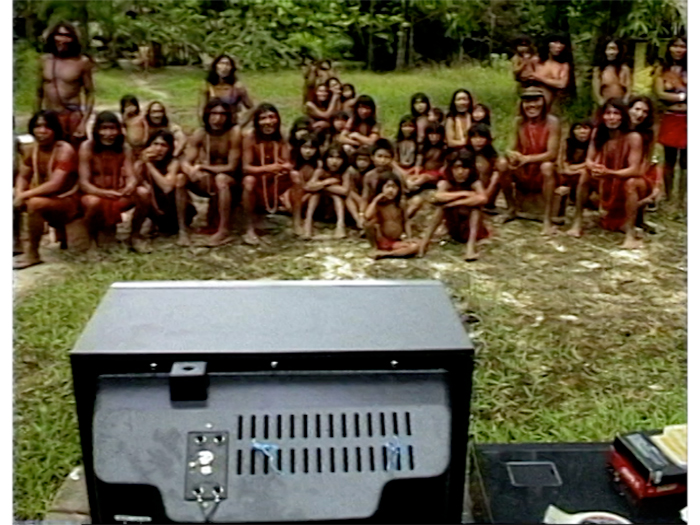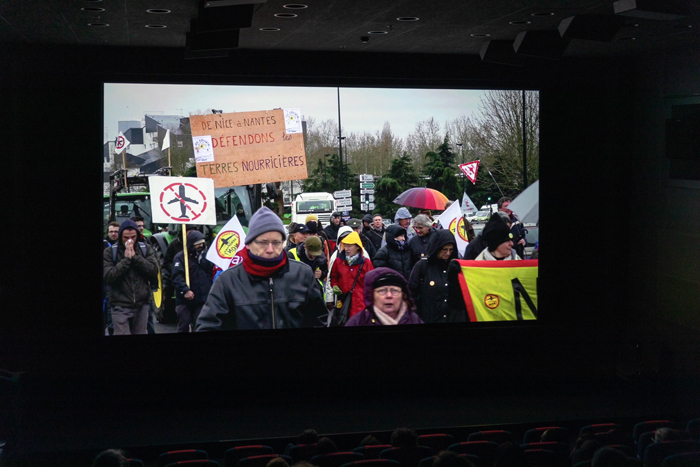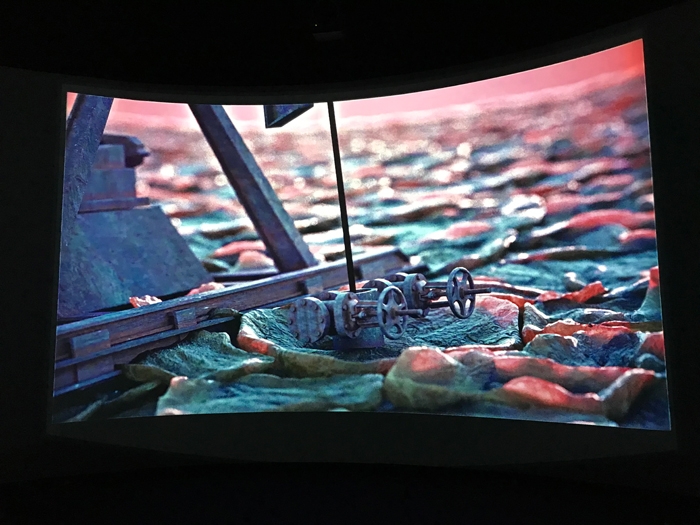Is it ‘artwashing’ for the state to fund a biennial raising awareness of the climate crisis, even when that money comes in large part from the extraction of fossil fuels? Devoted to the ‘expanded moving image in public space’ and hosted in the Norwegian city of Stavanger, the 2019 edition of Screen City Biennial was titled Ecologies – Lost, Found and Continued. This raises the question – given that the oil industry transformed Norway from one of the poorest nations in Europe into one of the richest, and brought prosperity to this historically working-class port – of the ethics of its engagement with themes of ecological collapse and extinction.
Rather than disguise the tensions between subject and site, curators Daniela Arriado and Vanina Saracino chose to highlight them. At Stavanger Airport, Tuomas A. Laitinen’s augmented reality work Tentacle Tongue (2019) drew attention to the fact that the recent proliferation of biennials has relied in large part upon the cheap international flights (including the one that brought me to Stavanger) that make it possible for even relatively small exhibitions to draw an international audience. The positioning of Andrew Norman Wilson’s video Ode to Seekers 2012 (2016) in the Norwegian Oil Museum – at the exit from a permanent exhibition about the environmental impact of the industry – felt particularly pointed. Drawing formal parallels between the sucking of mosquitoes (as transmitters of diseases), syringes (in the context of drug addiction) and oil pumps, Wilson provides a poetic counterpoint to the museum’s frank but faltering consideration of how the industry may become more sustainable. Its placement meant the work was also likely to receive a larger local audience – and thus move beyond the signalling of virtuous intentions to an international artworld – than attended the screening programmes at which most of the films and videos included in the biennial were shown.

These were staged in the city’s Odeon rather than in Stavanger Art Museum, presumably in an effort to avoid preaching solely to the converted. Again, the programming suggested a preoccupation with how artists could engage with the environmental crisis while also colluding with its architects. Vincent Carelli’s O Espírito da TV (1990) shows people from Brazil’s indigenous Waiãpi group discussing the impact of seeing themselves on .., less than 20 years after settlers first contacted them. Carelli used no narration and kept editing to a minimum, letting his interviewees bring up the issues around cultural appropriation and neocolonialism that are structured into ethnographic filmmaking, remaining aware that such work cannot resolve them.
I felt the contradictions most strongly in Chilean artist Enrique Ramírez’s Tidal Pulse II (2019), a soundwork commissioned to accompany a cruise of the .ords around Stavanger. Listened to through headphones, the work was extraordinary: a three-hour combination of ambient music, sounds sampled from the ship and interviews with artists, locals and oil workers, investigating the biennial’s ethical tensions in far greater depth than any other contribution. This was reinforced by the work’s real-life backdrop as seen from the ship, which stretched the ‘expanded cinema’ concept to its limit by replacing the representation of the landscape with its reality. But the impact of Ramírez’s work was restricted by two factors. Firstly, the nature of the commission meant that it was only likely to reach a relatively small number of festival-goers; secondly, it armed listeners with information about the environmental and cultural impact of the oil industry, but offered little idea of what could be done, politically, with this knowledge.

Austrian filmmaker Oliver Ressler’s two documentary films of Camps for Climate Action – at which activists gather to organise direct action against polluters – offered a model for wider impact and more direct action. Not only did the artist, whose work has always combined radical politics and formal experimentalism, gain the participants’ trust by making it clear that his aesthetic principles were subordinate to their politics, he has made the works available for online distribution under a Creative Commons license (as well as showing at biennials). Artists who really want to agitate for change, Ressler suggested, should put themselves at the service of activism rather than demand that activists concern themselves with art.
It is significant in the context of current debates around the oil industry and ‘artwashing’ that this biennial is funded by a state that invested the profits generated by the oil boom in advancing social-democratic principles. This did not and could not resolve the fundamental tension between the biennial’s theme and its site. But the fact that this is publicly funded (and introduced with a speech by the city’s new left-leaning mayor) does at least establish a link between artists and political representatives. If that can apply pressure on the people who might, ultimately, push towards the government-level action necessary to address the climate crisis, then there is value in staging the contradictions inherent to any collision between ‘moving images’ and ‘public space’, or art and the world.
Juliet Jacques is a writer and filmmaker based in London
From the December 2019 issue of ArtReview
